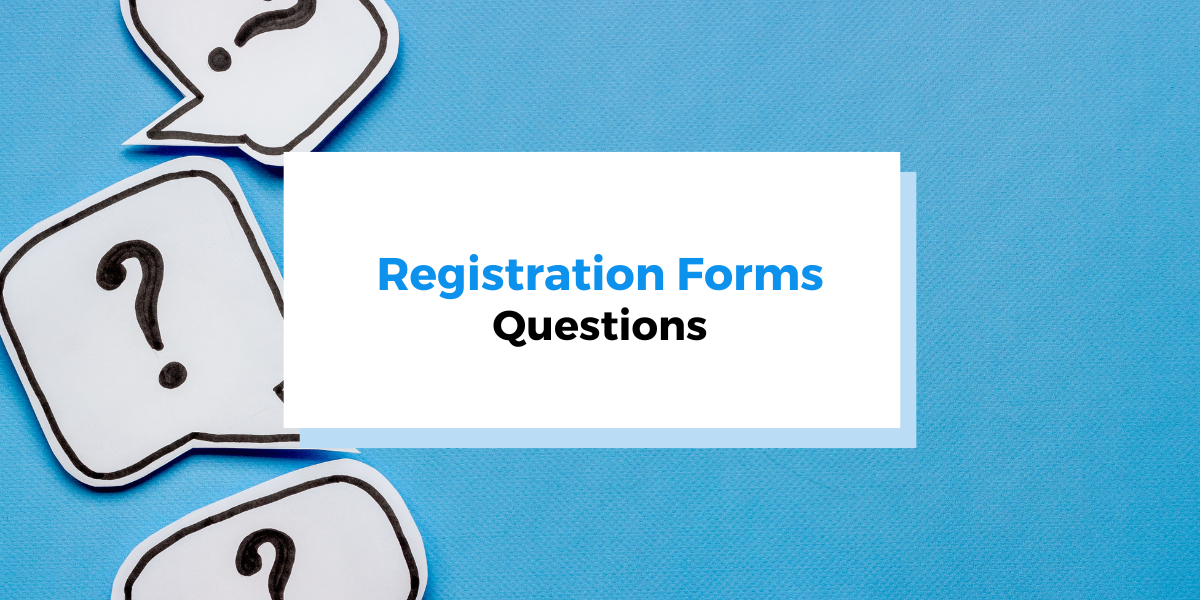Your registration form is more than just a way to sign people up; it’s an introduction to your team’s capabilities to provide an idealistic experience for your attendees. Effective registration forms optimize attendee management and planning by asking relevant questions–not just the standard bunch–directly relating to the upcoming event.
This blog will cover the must-have questions every registration form needs for an effective registration process and smooth attendee management.
Why Asking the Right Questions Matters
Registration forms are crucial for collecting the data required for a successful event, from contact information to preferred seating. Though these forms are standard for any event, not all include more granular details about attendees that can benefit your team during event planning and execution.
If all relevant information is included, the data becomes balanced, making planning the event and managing attendees easier.
Must-Have Registration Questions for Events
When structuring your registration forms, ensure these questions become the starting point for every online form.
Basic Personal Information
Before anything else, your online registration form should capture the attendee’s essential personal details. These foundational questions ensure you have accurate records and can reach participants as needed.
- Full Name
- Contact Information (email, phone)
- Date of Birth (if relevant)
- Photo ID (if needed)
- Etc.
Event-Specific Details
This section allows you to gather information about the attendee’s preferences and needs for the event. Understanding these details helps event organizers create a personalized experience and ensures all logistics are covered.
- Event Preferences (sessions, activities, or tracks)
- Dietary Restrictions or Preferences
- T-shirt Size (if providing event merchandise)
- Group size (if group registration is applicable)
Emergency Contact Information
Collecting emergency contact information is crucial for attendee safety. Having this information readily available can make a significant difference in an incident.
- Name and Relationship of Emergency Contact
- Emergency Contact Phone Number
Medical and Accessibility Needs
Ask attendees about medical conditions, allergies, or accessibility needs to create an inclusive and safe environment.
- Allergies and Medical Conditions
- Accessibility Requests or Accommodations Needed
Payment and Billing Information
If your event requires a fee, this section ensures a seamless payment process while clarifying billing preferences. Transparency in this area minimizes confusion and builds trust.
- Payment Details (if required at registration)
- Payment Options
- Invoice or Receipt Preferences
- Consent for Payment Terms
Marketing and Communication Preferences
Understanding how attendees wish to be communicated with and obtaining their consent for marketing use of their data fosters trust and ensures compliance with privacy regulations.
- Opt-In for Newsletters or Updates
- Consent for Marketing Use (photos/videos taken at the event)
Feedback and Additional Information
This section allows you to gather valuable insights from attendees. It helps you understand their motivations and expectations while allowing them to share additional details.
- How Did You Hear About Us?
- What Are Your Goals for Attending?
- Any Additional Comments or Special Requests
Best Practices for Designing Registration Forms
- Keep It Concise: Avoid overwhelming attendees with unnecessary questions.
- Use Conditional Logic: Ask follow-up questions only when relevant.
- Ensure Mobile-Friendly Design: Many users will register on mobile devices.
- Prioritize Data Security: Explain how data is stored and protected.
Common Mistakes to Avoid
Many administrators make the same common mistakes when creating an event registration form. Here’s what you need to look for:
- Overloading the Form with Questions: attendees can get lost quickly in a wall of text and cause form abandonment
- Failing to Test the Form Before Launch: buggy registration processes negatively affect attendee satisfaction
- Not Collecting Critical Information (like emergency contacts): this can lead to serious problems if a situation occurs with an attendee
- Failing to Implement Registration Deadlines: late-arriving registration forms can turn into a logistical nightmare
How Regpack Simplifies the Process
A well-designed form not only simplifies the registration process for attendees but also allows you to collect actionable and accurate data without bombarding your attendees with overloaded forms. Asking the right questions is key to rounding up the information you need to deliver a memorable experience.
With Regpack, you can effortlessly create customized forms that ask the right questions during fight time. Our AI-powered platform automates registration and payment processing, streamlines data collection, and organizes responses without complicating the registration workflow for your attendees. By optimizing your forms to gather essential registration information, you save time, improve attendees’ satisfaction, and set up your event for success.
Our intuitive software provides the following:
- Dynamic Registration Forms: Tailored conditional logic allows you to structure the workflows that benefit your organization—live edit forms on a dime.
- Secure Payment Integration: Streamline payment processing, allowing attendees to make full or partial payments in one smooth transaction. Embed payments on your website to build trust with your attendees and ensure their financial data is safe on your platform.
- Streamlined Data Management: Analyze attendee or payment data in real time. Adjust future events based on attendee preferences–like inclusions or food options—and share reports with our tagging system throughout your organization.
Discover How Regpack Can Transform Your Registration Process
Regpack’s robust registration solutions make creating professional, customizable forms tailored to your unique needs easy. Whether you manage camps, courses, educational tours, events, or conferences, Regpack gives you the tools to design forms that work for you and your attendees.
With flexible customization options, you can collect the exact information you need while providing a seamless registration experience. Explore how Regpack can help you simplify registration, save time, and deliver a more organized and stress-free process for you and your participants.
Ready to elevate your registration process?
Start building better forms with Regpack today.

